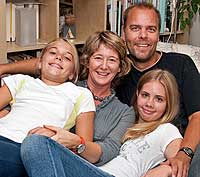Lutz Koepnick, Ph.D., professor of German in Arts & Sciences, and Jana Harper, senior lecturer in book arts in the Sam Fox School of Design & Visual Arts, are the newest members of the faculty fellows program in the South 40.
The two live in an apartment with Koepnick’s daughters in the Danforth House in William Greenleaf Elliot residential college, aiming to interact more informally with students outside the classroom setting.

“I think that having a family in the building where the students live can be quite grounding for them,” Harper said. “The fact that there are kids and pets in the students’ living environment is fantastic. It softens their transition from home life to living on their own.”
The goal of the faculty fellows program, started in 1998, is to help integrate academic and residential life by having professors live in the residential colleges with students for three-year stints.
The program emerged in response to the realization that there was a growing gap between faculty members and undergraduate students on college campuses. In addition, many faculty members wished to extend their interaction with students outside the academic realm.
Koepnick and Harper are two of six faculty fellows currently living in the South 40. Joining them are Joseph Thompson, Ph.D., academic coordinator in African and African American studies in Arts & Sciences, who lives in Park/Mudd residential college; Asad Q. Ahmed, Ph.D., assistant professor of Arabic and Islamic studies in Arts & Sciences, in Wayman Crow; Ian MacMullen, Ph.D., assistant professor of political science in Arts & Sciences, in Brookings; and Andrew Rehfeld, Ph.D., associate professor of political science, in Liggett/Koenig.
“I think this program provides a very unique opportunity to explore student-faculty relationships beyond the restrictions of the regular seminar room,” Koepnick said. “I have been teaching at the University for 15 years both at the graduate and the undergraduate level. But over the years, I have come to realize that we often know only very little about what makes our undergraduates tick and how we can effectively address their needs.
“I very much hope that the program will provide us with the opportunity to bridge the gap between the academic and the residential, the world of the mind and the everyday,” Koepnick said.
Koepnick and Harper have numerous programs planned for students in their residential college this year. The first, “Surviving College 101,” is a program of practical tips for first-year students on communicating effectively with faculty members. It will be held at 7 p.m. Sunday, Sept. 20, in Danforth House.
In collaboration with the Office of Orientation, they’ve also started the Danforth Photo Project, an opportunity for Danforth residents to document their transition into the University community.
The couple plans biweekly dinners in their apartment with students. They also are working with the faculty associates of Danforth House to plan a series of food films; a rafting trip on the Meramec River; and a panel discussion on the 20th anniversary of the fall of the Berlin Wall organized by Koepnick, born in what was then West Germany.
“The faculty fellows program has the potential of breaking down barriers between students and faculty and adding new and different dimensions to our relationships,” Harper said. “They see firsthand that we are humans and have human needs just like them and the other adults in their lives. We have barbecues in our backyard and take walks and read in the sun and laugh and have a good time.”
Koepnick said he hopes living on campus will provide a great opportunity for his two daughters, Kirstin, 10, and Nicola, 13, not only to meet and interact with students who often miss their own younger siblings but also “to help our kids to think about their own future in a more relaxed fashion, to realize that college kids have normal lives as well and do all the kinds of things that other people do.”
While they certainly are not aiming to become surrogate parents to the undergraduates, Koepnick hopes the family’s presence is educational for students.
“What they can hopefully glean from our presence here is the fact that the world of learning stretches all the way from the home to the lecture hall,” Koepnick said.
“Teaching and researching, thought and writing, attentive reading and rigorous argumentation are things that do not simply happen in an existential vacuum; we take the lives of our students as seriously as their minds,” he said.